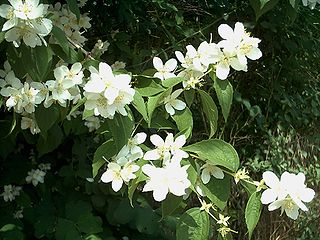
Pelargonium is a genus of flowering plants that includes about 280 species of perennials, succulents, and shrubs, commonly called geraniums, pelargoniums, or storksbills. Geranium is also the botanical name and common name of a separate genus of related plants, also known as cranesbills. Both genera belong to the family Geraniaceae. Carl Linnaeus originally included all the species in one genus, Geranium, and they were later separated into two genera by Charles Louis L'Héritier de Brutelle in 1789.

Robert Fortune was a Scottish botanist, plant hunter and traveller, best known for introducing around 250 new ornamental plants, mainly from China, but also Japan, into the gardens of Britain, Australia, and the USA. He also played a role in the development of the tea industry in India in the 19th century.

Pleioblastus is an East Asian genus of monopodial bamboos in the grass family Poaceae. They are native to China and Japan, and naturalized in scattered places in Korea, Europe, New Zealand, and the Western Hemisphere.

Trachycarpus fortunei, the Chinese windmill palm, windmill palm or Chusan palm, is a species of hardy evergreen palm tree in the family Arecaceae, native to parts of China, Japan, Myanmar and India.

Saxifraga is the largest genus in the family Saxifragaceae, containing about 465 species of holarctic perennial plants, known as saxifrages or rockfoils. The Latin word saxifraga means literally "stone-breaker", from Latin saxum + frangere. It is usually thought to indicate a medicinal use for treatment of urinary calculi, rather than breaking rocks apart.

Osmunda regalis, or royal fern, is a species of deciduous fern, native to Europe, Africa and Asia, growing in woodland bogs and on the banks of streams. The species is sometimes known as flowering fern due to the appearance of its fertile fronds.

Miscanthus sinensis, the eulalia or Chinese silver grass, is a species of flowering plant in the grass family Poaceae, native to eastern Asia throughout most of China, Japan, Taiwan and Korea.

Senecio macroglossus, the Natal ivy, marguerite ivy, climbing senecio or wax ivy, is a species of flowering plant in the family Asteraceae, native to southern Africa, from Zimbabwe and Mozambique to eastern South Africa.

Chusquea culeou, the Chilean bamboo, is a species of flowering plant in the grass family Poaceae. An evergreen bamboo native to South America, unlike most species within the genus Chusquea, it is frost-tolerant and thus widely cultivated in temperate regions.

Cyrtomium falcatum is a species of fern, commonly known as house holly-fern and Japanese holly fern, in the wood fern family Dryopteridaceae. It is native to eastern Asia.

Neoblechnum is a genus of ferns in the family Blechnaceae, subfamily Blechnoideae, with a single species Neoblechnum brasiliense, according to the Pteridophyte Phylogeny Group classification of 2016. The genus is accepted in a 2016 classification of the family Blechnaceae, but other sources sink it into a very broadly defined Blechnum, equivalent to the whole of the PPG I subfamily; the species is then known as Blechnum brasiliense. It is called Brazilian dwarf tree fern, red Brazilian tree fern, and red dwarf tree fern.

Philadelphus coronarius is a species of flowering plant in the family Hydrangeaceae, native to Southern Europe.

The Bambouseraie de Prafrance is a private botanical garden specializing in bamboos, located in Générargues, near Anduze, Gard, Languedoc-Roussillon, France. It is open daily in the warmer months; an admission fee is charged.

Selaginella kraussiana is a species of vascular plant in the family Selaginellaceae. It is referred to by the common names Krauss' spikemoss, Krauss's clubmoss, or African clubmoss, and is found naturally in parts of Sub-Saharan Africa and in Macaronesia. It is sometimes given the misnomer of “peacock fern”, due to its lacy leaf structure, despite having no relation to actual ferns; rather, it belongs to the very ancient lineage of plants known as the clubmosses.

Parodia magnifica is a species of flowering plant in the family Cactaceae, native to southern Brazil. One of several species called ball cactus, it grows to 7–15 cm (3–6 in) tall by 45 cm (18 in) broad, with heavily ribbed, spherical to columnar, spiny and hairy stems, bearing pale yellow flowers in summer. Its natural habitat is cool, dry temperate grassland at elevations of up to 800 m (2,600 ft). Populations are sparse and fragmented, and it has been designated as “Endangered” by the IUCN Red List.

Hosta sieboldiana, Siebold's plantain lily, is a species of hosta native to Japan. A putative variety, Hosta sieboldiana var. elegans, has gained the Royal Horticultural Society's Award of Garden Merit, as has a putative variety of its synonym; Hosta fortunei var. aureomarginata, the gold-edged plantain lily. The cultivars 'Blue Angel', 'Blue Mammoth', and 'Olive Bailey Langdon' have also gained the RHS Award of Garden Merit.

Cyrtomium fortunei, also known by its common name Fortune's holly-fern, is a species from the genus Cyrtomium. This plant was first described by John Smith. It has gained the Royal Horticultural Society's Award of Garden Merit.

Pleioblastus viridistriatus, kamuro-zasa, is a species of bamboo in the grass family Poaceae, native to Japan. Growing to 2.5 m (8.2 ft), it is a compact bamboo with striking green and yellow striped leaves 25 cm (9.8 in) long, and darker vertical stems.

Coleus madagascariensis, synonym Plectranthus madagascariensis, called thicket coleus, Madagascar coleus and candle plant, is a species of flowering plant in the family Lamiaceae. It is native to South Africa, eSwatini, Mozambique, Mauritius and Réunion, but not Madagascar. Its cultivar 'Variegated Mintleaf' has gained the Royal Horticultural Society's Award of Garden Merit.

Phlebodium areolatum, the Virginia blue fern, is a species of epiphytic fern in the family Polypodiaceae. It is native to the New World Tropics and Subtropics; Mexico, Florida, some of the Caribbean islands, Central America, and South America to Argentina, and has been introduced to India. As its synonym Phlebodium pseudoaureum it has gained the Royal Horticultural Society's Award of Garden Merit.





















